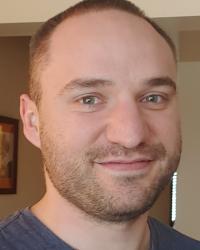
Biography
I am a PhD candidate in the History Department and a senior research scientist at the University of Washington Medical Cyclotron Facility. I have a background in physics, where among other things I wrote and operated numerical models of experimental systems. My dissertation explores both the history of scientific practice in climate modeling and the practices of historians working in the US. I am also working on a Graduate Certificate in Climate Science through the UW Program on Climate Change, and I had a summer job working with a climate modeling group here in 2019.
I began my academic career in the sciences, earning a master’s degree in low-energy experimental nuclear physics. I first took a research position in 2008 at the UW Center for Experimental Nuclear Physics and Astrophysics, a lab built around an accelerator that has been in regular operation since 1965. If there is a better playground for a physics undergraduate with a passion for history and philosophy of science, I have yet to find it. The organic amalgamation of old and new technology there, featuring things like desktop PCs cabled to hulking detector electronics with vacuum tube displays, and the tight-knit community continually repurposing old tools for new science were object lessons in the historical and social construction of new empirical results.
By 2015 I had participated in research at national laboratories in three countries (Berkeley National Lab in the US, GSI in Germany, and TRIUMF in Canada) and I had become familiar with the global networks of people and manufacturers supporting them. I was increasingly concerned that those networks might not be sustainable in the face of radical climate change, which could catastrophically transform infrastructure and supply chains around the world. The record-breaking North American wildfires of 2016, which forced the evacuation of a city in Alberta and whose smoke reduced visibility around my Vancouver apartment to a few blocks, convinced me that I could do some good working to understand the scientific and societal scale of the climate crisis.
I am driven to create deeper knowledge about the past so that we might better navigate our present and our future in a warming world. This requires new attention to the historical construction, maintenance, and ongoing operation of climate models. I am drawing on my multidisciplinary expertise to make a novel archival database scholars can use to generate historical research questions from the vast literature on planetary science (the code for the database is available on github). This tool supports critical analyses of oral histories and laboratory archives, informing my work in the history and philosophy of science.
I currently work as a research scientist/engineer at the UW medical cyclotron, where I apply both my laboratory skills and my historical expertise operating, maintaining, and modernizing a 40-year-old accelerator facility where we deliver both radiation therapy and medical isotopes for novel cancer treatment.
Awards
Research
Selected Research
- E. Leistenschneider et al., “Diversifying Beam Species through Decay and Recapture IonTrapping: a Demonstrative Experiment at TITAN-EBIT,” Journal of Physics G: Nuclearand Particle Physics 47 (2020): 045113. 10.1088/1361-6471/ab6ee1
- C. Babcock et al., “Mass measurements of neutron-rich indium isotopes toward the N = 82 shellclosure,” Physical Review C 97 (2018): 024312. 10.1103/PhysRevC.97.024312
- E. Leistenschneider et al., “Dawning of the N = 32 shell closure seen through precision massmeasurements of neutron-rich titanium isotopes,” Physical Review Letters 120 (2018):062503. 10.1103/PhysRevLett.120.062503
- Devin Short, "Nuclear Isobar Separation for Penning Trap Mass Measurements at TRIUMF," (M.Sc. thesis, Simon Fraser University, 2018).
- D. Lascar et al., “Precision mass measurements of 125-127Cd isotopes and isomers approaching theN = 82 closed shell,” Physical Review C 96 (2017): 044323. 10.1103/PhysRevC.96.044323
- A. T. Gallant et al., “Mass determination near N = 20 for Al and Na isotopes,” Physical Review C96 (2017): 024325. 10.1103/PhysRevC.96.024325
- S. Triambak et al., “The 2+1 → 3+1 γ width in 22Na and second class currents,” Physical Review C95 (2017): 035501. 10.1103/PhysRevC.95.035501
- D. Lascar et al., “Improvements to TITAN’s mass measurement and decay spectroscopycapabilities,” Nuclear Instruments and Methods B 376 (2016): 292-297. 10.1016/j.nimb.2015.12.026
- Christian Jesch et al., “The MR-TOF-MS isobar separator for the TITAN facility at TRIUMF,”Hyperfine Interactions 235 (2015): 97-106. 10.1007/s10751-015-1184-2
- Wolfgang R Plaβ et al., “High-performance multiple-reflection time-of-flight mass spectrometersfor research with exotic nuclei and for analytical mass spectrometry,” Physica Scripta2015 (2015): 014069. 10.1088/0031-8949/2015/T166/014069
- C. Wrede et al., “Preparation of 20Ne, 24Mg, 28Si, and 36Ar targets by ion implantation into thincarbon foils,” Nuclear Instruments and Methods B 268 (2010): 3482-3484. 10.1016/j.nimb.2010.09.009